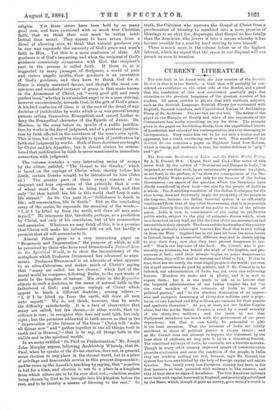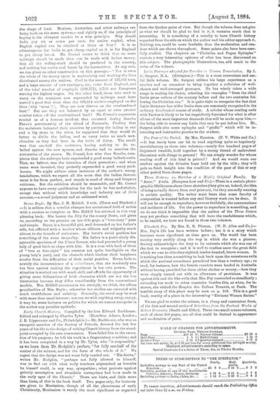The Economic Revolution of India and the Public Works Policy.
By A. B. Connel, M.A. (Regan Paul and Co.)—The value of this latest work by the author of "Discontent and Danger in India," is impaired, as was that work, by an unreasonable pessimism. Its object, as set forth in the preface, is "to show the consequences of the Pro- ductive Public Works policy, not only for the finances of the Indian Government—an aspect of the question which the Stracheys have chiefly considered in their book—but also for the people of India as a whole. The flourishing condition of the Indian Exchequer for the time being, does not necessarily imply the prosperity of the people in the long-run, because the Indian financial system is so differently conditioned from that of any other Government, that it is impossible to argue directly from the state of the public to that of the private purse. India is now, in consequence of the outlay on productive public works, subject to the play of economic forces which, when once launched on any land, are like the tides of the sea, remorseless and irresistible in their strength. The dams and the landmarks of the country are being gradually submerged beneath the flood that is ever rolling on from the West. England has in the past let loose the same forces in Ireland, though in a somewhat different way, and is slowly trying to stay their fury, now that they have proved dangerous to her- self." This is the key-note of the book. Mr. Connel, who is pre- sumably an Irishman, has beheld the work of the English, and pro- nounces it bad ; until their misrule begins to prove dangerous to themselves, they will be deaf to warning and blind to fact. If this be true, then are we surely the most stupid people in the world ; yet even the stupid sometimes do good by mistake, and if Mr. Connel is to be believed, our administration of India has not even this redeeming feature. Blunders we make and in plenty, and it is well to expose them ; but it is too much to ask us to believe that the Imperial administration of our Indian Empire has led "to the total sacrifice of the interests of India to those of political parties," and "to the absolute domination of an aggres- • sive and energetic democracy of thirty-five millions over a popu- lation of two hundred and fifty millions, pre-eminent for their passive and apathetic character." As yet, at least, not the Indian Empire alone, but the entire British Empire, is ruled by a small minority of the thirty-five millions ; and the truth is, not that Parliament interferes too much with the government of our great dependency, but that it can hardly be persuaded to give it the least attention. That the interests of India are totally sacrificed to those of political parties is simply untrue ; and as Mr. Connel does not attempt to support the statement by the least show of evidence, we may pass it by as a rhetorical flourish. The subsidised railways of India, he contends, are a terrible mistake. Though in every other country improved means of communication promote civilisation and raise the condition of the people, in India they are working nothing but evil, because, says Mr. Connel, the system has been established by the help of foreign capital and native taxation. But nearly every non-European country has been, in the first instance at least, provided with railways in like manner, and they at least show no signs of decadence. The first American railways were built with capital borrowed in England, and practically subsidised by the State, which, though it gave no money, gave money's-worth in
the shape of land. Mexican, Australian, and other railways are being built on the same system,—and rightly so, if the principle of buying in the cheapest market be a wise principle. Why should India pay six or seven per cent, for native capital, when English capital can be obtained at three or four ? It is as advantageous for India to get cheap capital as it is for England to get cheap bread. Mr. Connel seems to think that no more railways should be made than can be made with Indian money, that all the rolling-stock should be produced in the country, and nothing but native coal burnt by the locomotives. At any rate, we can place no other construction on this passage,—" Nor is 'even the whole of the money spent in maintaining and working the lines distributed among the natives. Coal to the amount of 175,951. tons, and a large amount of new carriages, &c., come from England, and of the total number of employes (169,577), 3,763 are Europeans earning the highest wages. On the other hand, those who used to carry on the transport now superseded by railways must have earned a good deal more than the 165,814 natives employed on the lines [why ' mnst 'PI They are now thrown on the overburdened land." But are they not balanced by an equal or even greater number taken off the overburdened land ? Mr. Connel's arguments remind as of a famous incident that occurred during Sancho Panza's governorship of the island of Barataria. Finding that the muleteers balanced their panniers by putting the lading in one and a big stone in the other, he suggested that they would do better to divide the lading, and so carry twice as much mer- chandise as they had been in the habit of doing. The result was that one-half the muleteers, having nothing to do, re- belled against the new system, and Sancho had to sanction the restoration of the stones. Mr. Connel, less wise than Sancho, com- plains that the railways have superseded a good many bullock-carts. That, we believe, was the intention of their promoters ; and when carts were invented, they probably superseded a good many pack- horses. We might adduce other instances of the author's wrong- headedness, which we regret all the more that the Indian Govern- ment is far from perfect, and stands in need of sharp and frequent criticism. But the criticism should be reasonable, and Mr. Connel appears to have every qualification for the task he has undertaken, except that without which knowledge and industry are of little account,—a sound judgment and an unbiassed mind.



































 Previous page
Previous page